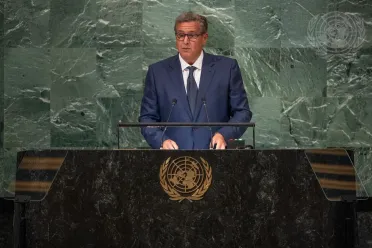Statement
Statement summary
AZIZ AKHANNOUCH, Head of Government of Morocco, pointing to the multidimensional crises three years after the onset of the COVID-19 pandemic, said what prevents the world from managing them is not lack of awareness, but a lack of political will. The multilateral system is suffering from a crisis of values in which individual interest, divisions within international institutions and the fragmentation of multilateral work undermine cooperation and solidarity. Affirming the role of the United Nations as more than crisis management, he said those who believe that their own capabilities are enough to contain these challenges are not being realistic. “Multilateral work was never a luxury and the crisis we are witnessing today affirms this and proves that the security and prosperity of some depends on the stability and prosperity of all,” he said.
Africa is the continent most affected by spillovers from the current geopolitical crises, bearing the brunt of increases in food and energy prices which have undermined sustainable development gains, he said. Despite setbacks, Africa continues to find solutions and emerge from the crisis stronger than ever. The continent has important human and natural resources and is committed to implementing the African Continental Free Trade Area agreement. “We will work collectively to realize the ambitions of our peoples,” he said, calling for international cooperation to reduce the continent’s debt burden and development initiatives to help it resist the shocks of current and future economic crises. The King of Morocco’s visits to several African countries reflect this. Morocco also hosted the fourteenth United States-Africa business summit to increase investment to priority sectors in African countries, built a manufacturing facility for COVID-19 and other vaccines to achieve vaccine sovereignty in the country and across Africa, and has extended health care services to 70 per cent of the population with the goal of universal coverage by year’s end.
Stressing that climate change requires immediate solutions, he said developed countries must mobilize the necessary technological and financial resources to face the consequences of this global challenge. Morocco has committed to reduce its greenhouse gases by 45 per cent by 2030, as part of an integrated strategy to create low-carbon development by 2050, as well as a green economy in line with sustainability goals.
Highlighting Morocco’s actions to alleviate the global security crisis, he said it will show solidarity in implementing its national strategy for migration and asylum launched in 2013, continue to fight human trafficking networks and guarantee the safety of peacekeeping forces. He went on to underscore the importance of gender equality and the rights of women going forward. His Government has launched a national action plan to implement the women, peace and security as an integrated political framework in line with Security Council resolution 1325 (2000).
He reiterated Morocco's commitment to finding a final political solution to the Moroccan Sahara issue based on the Moroccan Autonomy Initiative. In the southern regions, his Government is implementing the new development model launched in 2015. He reiterated Moroccan support on the forty-sixth anniversary of the Green March to the efforts of the Secretary-General and his personal Envoy to resume the round-table process in the same format and with the same participants to reach a lasting solution, stressing that Algeria’s serious, well-intentioned participation in these round tables and its recognition of its responsibility in creating and pursuing this artificial conflict is a condition to achieving a final political settlement. He expressed concern over the catastrophic humanitarian conditions in the Tindouf camps and called on the international community to urge Algeria to allow UNHCR to register the camp’s dwellers. Reiterating Morocco’s support for the Palestinian cause and calling for a two-State Solution, he also affirmed his country’s commitment to safeguard the historical identity of Jerusalem as a place of co-existence and peace. Welcoming the appointment of Abdoulaye Bathily as the Special Representative of the Secretary-General for Libya, he said the solution to the crisis in Libya should be “Libyan-led without any interference or any foreign agenda.”
Full statement
Read the full statement, in PDF format.
Photo

Previous sessions
Access the statements from previous sessions.
